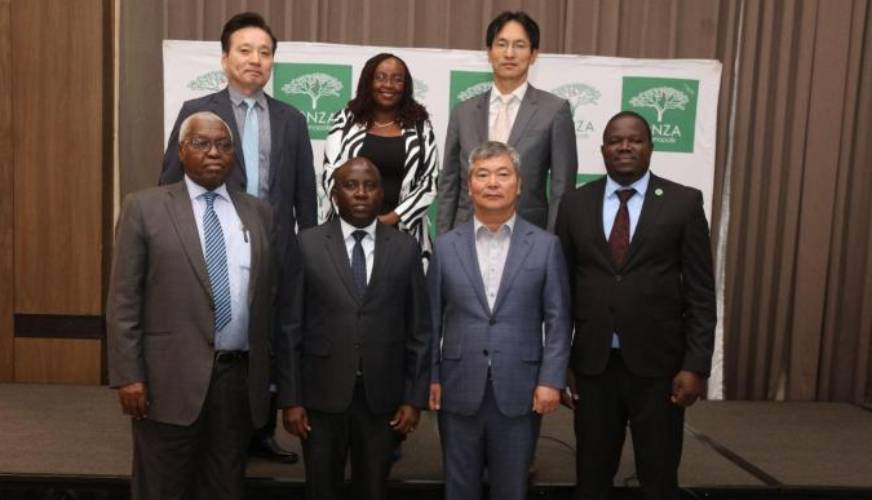By Lydia Limbe
As President Kibaki unveiled the cornerstone of the multi-billion shilling project in Konza, the hope was almost palpable. The question of unplanned development was, however, much in the mind of those present.
Dubbed the African Silicon Valley — after the Silicon Valley in San Francisco Bay in Northern California USA, which is home to among world’s largest technology corporations — Konza City will be the ICT hub of Africa upon its completion in 2030, coinciding with the country’s Vision 2030.
In his speech during the ceremony, President Kibaki expressed concern over the mushrooming of slums around Konza Technology City as it progresses and when it’s done.
Mushrooming of slums around urban centres has been experienced all over. To combat this, the Government through the Ministry of Land has issued a moratorium freezing land development within a ten-kilometre radius around Konza City.
“The ten kilometre radius will ensure planned physical structure and physical planning according to the guidelines identified in the zoning plan,” says Henry Mung’asia, Konza Technology City Business Process Outsourcing (BPO) director of administration.
The buffer zone is meant to regulate development and use of land around the 5,000-acre technology city. It is also meant to provide for orderly and progressive development of human settlements for sustainability.
INTEREST
The technology city is expected to become the pride of Africa in terms of ICT and attract international investors, especially from the targeted international IT firms.
Already 15 ICT firms have expressed interest to invest in the Konza Technology City. These include Samsung and other Asian firms, while local investors include Safaricom, Wananchi Group, Kenya Medical Research Institute, Kenya Agricultural Research institute, and Nairobi Hospital.
According to Information PS Bitange Ndemo, who spoke during the launch, the interest in th eproject is quite high. “We are getting multi-national real estate firms coming in with interest saying they can even finance the construction,” he said.
Divided into four phases in its projected 20 years construction period, Konza City will host ICT businesses in its vast 5,000 acre piece of land. The whole project is projected to amount to trillions of shillings with the first phase expected to cost a total of Sh255 billion.
To facilitate all these, Konza City has contracted HR&A advisors — a New York based real estate, economic development and energy efficiency consulting firm. The advisors, who won the contract valued at Sh168 million from a pool of 22 global firms, will oversee Konza’s real estate, business and governance planning strategies.
There are three proposed investor approaches in Konza City. The single private master developer that is HR&A in this case — undertakes the master planning of the entire property under Master Development Agreement and finances its development or through sub-developers.
The Government, on the other hand, will finance the backbone infrastructure fully or partially. The accounting officer established will be a joint government and private master developers with terms and responsibilities of each party to be determined.
Stay informed. Subscribe to our newsletter
Konza City will not be just another city as was made clear during the unveiling of the project; but the technology in the construction of the state of the art buildings and designs found in major world cities.
PHASE ONE
According to Konza Technology City official website, success indicators for phase one to be concluded by 2017 include construction of a new, high quality hospital, a science and technology university and a small number of high quality technology anchor tenants.
Success will also include the creation of a diverse and vibrant city, which currently includes 1.1 million square metres of residential development, 100,000 square metres of commercial offices, 200,000 square metres of university and dormitory and 100,000 square metres of amenity space.
Phase one will include 30 hectares of urban parks as well as a large wildlife corridor along the southern boundary of the site. These spaces will be critical to creating an attractive community, which will attract entrepreneurial technology leaders and businesses. The total provision of jobs is expected to be 200,000 plus jobs.
CHALLENGES
The Konza Technology City has had its share of hurdles before the groundbreaking took place last Wednesday. The establishment had been met by bureaucracy problems within Government ministries with approvals to be made.
“We had delays because of statutory local development plans that needed to be approved before we hit ground,” says Henry.
Konza Technology City construction involves a joint effort from different Government ministries. These include the Ministry of Public Works, Ministry of Water and Ministry of Energy.
“There is an inter-ministerial committee that meet regularly. They would ensure smooth running process of the Konza Technology City,” says Henry.
As soon as the Konza Technology City ground-breaking ceremony was over, local land agents could be seen distributing their business cards that offered great deals on land ‘touching’ Konza City. A city has to live up to its name with the appropriate resources to back it up. This becomes even more essential when building a smart city, which Konza City is set to be.
Currently underway are a number of key infrastructures that would see the three counties of Machakos, Makueni and Kajiado — within which Konza lies — develop as well.
Nairobi-Mombasa Road dual carriageway currently running up to Athi River will be extended to Konza City starting January next year to 2016 in two phases.
A 300,000 cubic metre water dam providing piped water for the city and environs from Thwake River has already been financed and is under construction. Four boreholes of the proposed ten have already been sunk on site.
A standard gauge rail that can achieve speeds of up to 160kph, taking 40 minutes to Nairobi and 20 minutes to the Jomo Kenyatta International Airport, Nairobi is to be launched in a month’s time on top of the already existing rail system being upgraded.
Developments at Konza and its surroundings will be overseen by Konza Technocity Development Authority – KOTDA – headed by Investment banker John Ngumi.
“KOTDA will take over from BPO. The move is set to separate the Konza City Development from the Government. This would ensure efficiency in the running of Konza City,” says Henry Mang’asia.
 The Standard Group Plc is a
multi-media organization with investments in media platforms spanning newspaper
print operations, television, radio broadcasting, digital and online services. The
Standard Group is recognized as a leading multi-media house in Kenya with a key
influence in matters of national and international interest.
The Standard Group Plc is a
multi-media organization with investments in media platforms spanning newspaper
print operations, television, radio broadcasting, digital and online services. The
Standard Group is recognized as a leading multi-media house in Kenya with a key
influence in matters of national and international interest.
 The Standard Group Plc is a
multi-media organization with investments in media platforms spanning newspaper
print operations, television, radio broadcasting, digital and online services. The
Standard Group is recognized as a leading multi-media house in Kenya with a key
influence in matters of national and international interest.
The Standard Group Plc is a
multi-media organization with investments in media platforms spanning newspaper
print operations, television, radio broadcasting, digital and online services. The
Standard Group is recognized as a leading multi-media house in Kenya with a key
influence in matters of national and international interest.








